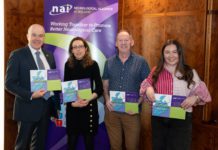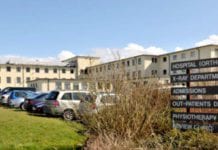
University of Galway researchers will lead an international research project exploring therapeutics targeting one of the most aggressive and challenging cancers to affect women.
Led by Professor Sharon Glynn, the research will examine new therapeutics to treat Triple Negative Breast Cancer (TNBC), which affects about 10 to 15% of women diagnosed with breast cancer.
The cancer is highly aggressive and challenging to treat as it lacks hormone receptors, making targeted therapies ineffective.
As a consequence, treatment options for women suffering from the disease are limited to surgery and chemotherapy.
The research team is a collaboration between University of Galway; CÚRAM, Galway Clinic, Saolta, and a number of universities in Europe.
Professor Glynn, through her dedicated research over the past 15 years, has made significant advancements in understanding TNBC.
“A big issue with this type of breast cancer is that it tends to be more aggressive from the very start and it carries a higher risk of spreading early to different parts of the body,” she said.
“Also, women can be diagnosed at a very young age with this cancer – often before standard breast cancer screening begins at the age of 50.”
Professor Glynn said that she and her team have been working to find new ways to treat TNBC, including the discovery of inducible nitric oxide synthase (iNOS) levels predicting poor outcomes in hormone receptor-negative breast cancer.
“Women whose tumour had high levels of iNOS were five times more likely to die from breast cancer than those who had low levels providing us with a new therapeutic opportunity.
“This project will take two approaches to target nitric oxide, one which can trigger cell death and tumour regression, and the second, by targeting blood flow and tumour vasculature.”
Dr Jenny Chang, a specialist in Breast Medical Oncology and Director of the Houston Methodist Hospital, said the cancer landscape is a fast-moving and ever-progressing area of research.
“Treatment modalities for various cancers have drastically improved in the past 10 years,” she said.
“However, our fight to treat some form of cancers, especially rare, aggressive and metastatic disease is still on going. We are delighted to collaborate with NO-CANCER-NET led by University of Galway as part of an international network, which will train the next generation of doctoral students.
“This network will provide a unique opportunity to understand the complexities of bench to bedside cancer research, as well as the importance of an interdisciplinary approach and an understanding of the fundamentals of related disciplines.
“This will be of great importance in preparing these students to work between academia, industry and in clinical healthcare providers. This skillset will accelerate the development of new therapeutics like NO-related therapeutics.”
Professor Abhay Pandit, Director of CÚRAM, and co-Principal Investigator in NO-CANCER-NET, said: “CÚRAM has internationally renowned expertise in research for the development and delivery of therapeutics, in addition to being model for expert training of postgraduate and postdoctoral scientists.”










